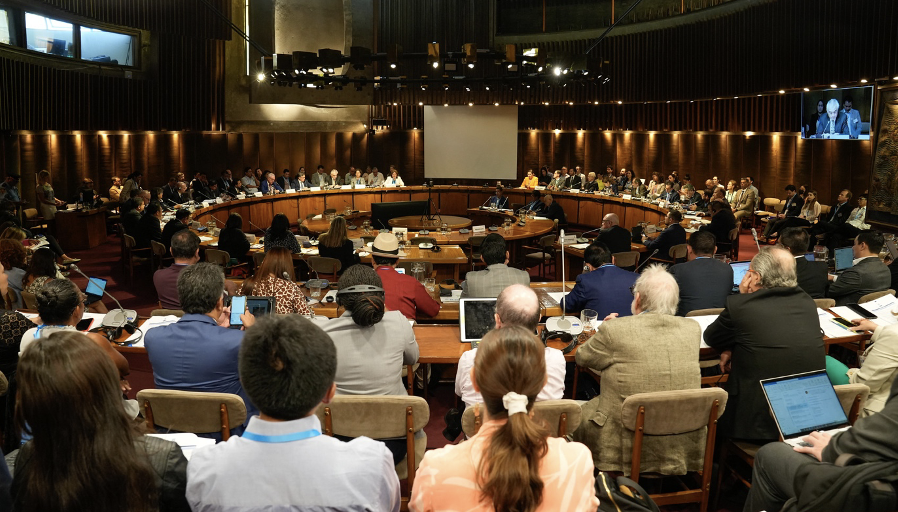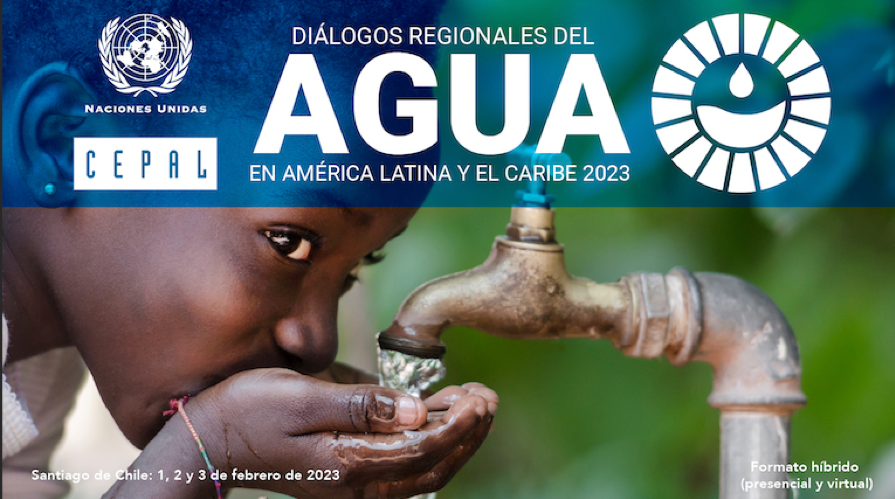This was ECLAC's 2023 Regional Water Dialogues
Topic(s)
Teaser
On February 1, 2 and 3, the Regional Water Dialogues were held, from which the Regional Water Action Agenda was elaborated. It included all the commitments made to accelerate the achievement of SDG 6 in Latin America and the Caribbean. Check out here who participated, the main results and photos of the event.
Event information

Date
6 Feb 2023, 06:00 - 11:05Event type
ECLAC organized the 2023 Regional Water Dialogues between February 1 and 3 at ECLAC’s headquarters in Santiago, Chile. This event is part of the regional preparatory process for the 2023 UN Water Conference. It was attended by 200 on-site participants representing more than 20 countries in the region, and had the participation of more than 80 panelists of the highest level. Among them, the Vice President of El Salvador, Mr. Félix Ulloa, six ministers and seven vice ministers from different countries in the region can be mentioned. In addition, there was strong representation from civil society, through indigenous groups, primary and secondary students, women's and youth associations, rural communities, and non-governmental organizations (NGOs). The private sector, international development banks and academia were also present.
Participants
As the event had a hybrid modality, it also had more than 3,700 registered participants online, representing more than 70 countries. Of these, 52% identified themselves as male and 46% as female. While the participants represented a wide geographic variety, 65% of all attendees were from South America.
According to the results obtained from the closing survey carried out by ECLAC after the event, the general assessment was extremely positive and the average general satisfaction was 4.58 (on a scale of 1 to 5). The most common comments were gratitude for the high quality of the panelists and the topics covered, and the diversity and inclusion of various actors and especially NGOs, women, youth and native communities. Likewise, the broad approach to addressing SDG 6 was recognized and special mention was made to the fact that the event emphasized the different realities of the region. Among the requests for improvement, to give even more spaces for dialogue appeared, even though other participants appreciated these spaces, indicating that the event allowed a more inclusive participation.
Messages High Level Session 1. On Wednesday, February 1
Throughout the first day, the messages to highlight were:
- The relevance of water as a development vector, in a context of great water and socioeconomic challenges in the region. Here, the urgency to universalize the Human Right to Water and Sanitation is reiterated, advancing towards ECLAC's proposal for an inclusive and sustainable water transition.
- Regarding water and its relationship with sustainable development, it was identified that despite the achievements and innovations in institutional strengthening and towards adequate water governance, countries still face numerous challenges. Within them, to strengthen the institutional system in water matters, as well as adding hierarchical rank to the countries' water authorities, eliminating institutional gaps and facilitating coordination were mentioned. Likewise, it is necessary to establish collaboration systems between the various authorities, managers and citizens.
- Regarding climate issues and resilience to the climate change, early warning systems were reviewed as of elements of vital importance. They reduce the population's risk of exposure and promote faster recovery from the impacts of disasters. Similarly, investment in Integrated Water Resources Management (IWRM) is required as a solution to better manage these situations and build resilience, especially in the Small Island Developing States (SIDS) of the Caribbean.
On this first day, the launch of the LAC Network and Observatory for Water Sustainability (ROSA) was also carried out, promoted by ECLAC and the five pilot countries of the project. This network and water observatory responds to the main needs for capacity building for the development of innovative water policies. For the same reason, a Regional Water Sustainability Network for the exchange of good practices, information, data and evidence to promote compliance with SDG 6 in the region will be established, together with an Observatory for Water Sustainability, a digital repository with policy documents and information on activities relevant to the achievement of the same SDG. In addition, it includes the development of technical assistance to collect and use SDG 6 indicators, according to priority areas and needs. All of the above will be built jointly and will be enriched to the extent that the countries can contribute, get involved and benefit. For more information, click here.
Messages High Level Session 2. On Thursday, February 2
Among the main messages that emerged throughout the 2023 Regional Water Dialogues, on their second high-level day, were:
- Financial resources are required, especially in countries with greater infrastructure and coverage deficits. For this, it is essential to identify and mobilize the sources of financing and appropriate financial instruments such as loans, bonds or other blended financing instruments. At the same time, it is necessary to make the most of available and incoming financial opportunities, such as adaptation and mitigation finance and nature-based solutions. Public-private partnerships (PPPs) also stand out as mechanisms for accessing finance, since the experience of the private sector can be harnessed.
- In the same way, regional and territorial cooperation is essential when talking about a resource that does not recognize borders. Strengthening regional and territorial water cooperation so that it is inclusive, intersectoral and action-oriented is a fundamental task. Show your benefits at multiple scales and across sectors. Collaboration is not just a useful option, but a necessary condition for achieving the SDG targets.
- The extraction, uses, treatment and return of water to ecosystems are inevitably related to renewability and energy security, food security and environmental sustainability. It was shown that it is crucial to capitalize on the synergies and interrelationships involved in decision-making, planning and water management, which in turn enhances the advancement of other sustainable development goals contained in the 2030 Agenda.
Messages Technical conference: Solutions to value water and accelerate the achievement of SDG 6 in Latin America and the Caribbean. On Friday, February 3
This day focused on the presentation of concrete solutions that are being carried out in the region to shorten the gaps in the 2030 Agenda in terms of water.
- The actions and solutions presented are aligned with the United Nations water valuation principles. The above, for example, in terms of considering the multiple values of water, the different stakeholders in it and all the interconnections that emerge between human needs, economic well-being, spirituality and the viability of freshwater ecosystems that must be considered in decision making. The relevance of carrying out conciliation processes in an equitable, transparent and inclusive manner is also highlighted; to value and protect all water sources, including watersheds, rivers, aquifers, and associated ecosystems for current and future generations; to promote education and public awareness of the essential role of water and its intrinsic value; and to increase investment in institutions, infrastructure, information and innovation.
- Here, concrete solutions were presented that are being carried out in the region to shorten the gaps in the 2030 Agenda in terms of water. Among the solutions presented, governance initiatives stand out, such as local cooperation projects on drinking water and sanitation in a municipality in Chiapas, Mexico; one on floodwater management and water pollution in Costa Rica; with environmental aspects with the initiative Adopt a River of Trinidad and Tobago; and incorporating agricultural materials with a peasant community in Huancavelica, Peru. In addition, innovative solutions focused on capacity development were presented , such as initiatives for education and the empowerment of women in Brazil; considering ancestral practices and indigenous communities in Argentina and Mexico; and a project with schools and their students in Chile. Finally, in matters of financial innovation, the Andean Platform for Water Funds was presented; an innovative financing project for waterworks in El Salvador, as well as a small transnational hydroelectric plant in El Salvador and Honduras, managed locally.
- With this, the technical day was linked to the acceleration framework for the achievement of SDG 6, highlighting that for the progress of the countries it is necessary to work in these five spheres: financing; data and information; capacity development; innovation; and governance.
Report of the Regional Water Dialogues 2023
In order to compile all the interventions and actions that the region is carrying out at this time, ECLAC summarized the event in a publication that can be accessed here. The preliminary report offers a summary of the presentations and interventions carried out throughout the Regional Water Dialogues 2023, together with the key messages of each panel, and the main results. Likewise, access to all the presentations and to the Regional Agenda of Action for Water presented, can be found at this link.
Photos of the Regional Water Dialogues 2023
To access the official photo gallery of the event, follow the following link .
Related content

ECLAC will bring the voice and commitments of Latin America and the Caribbean to the United Nations Water Conference
Next week the United Nations Water Conference will take place in New York, an event that has not been held since 1977. Here, ECLAC will be participating in different events to highlight the needs and…

Great success: the 2023 Regional Water Dialogues organized by ECLAC had a high turnout and managed to establish a Water Action Agenda for Latin America and the Caribbean
During the past week, ECLAC organized the Third Edition of the Regional Water Dialogues in LAC, which are part of the regional preparatory process for the 2023 United Nations Water Conference.